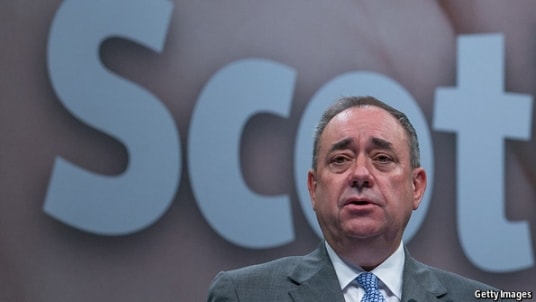Alex Salmond and Scottish nationalism
(Baonghean.vn) - In 2000, when Alex Salmond left politics, his 10 years as leader of the separatist Scottish National Party (SNP) left a rather modest legacy: the Labour Party dominated Scottish politics, the SNP was divided internally, and secession from the UK seemed unthinkable. 14 years later, the man who was once described by The Telegraph as having a "lackluster performance" once again left the political stage, but this time with his head held high.
(Baonghean.vn) - In 2000, when Alex Salmond left politics, his 10 years as leader of the separatist Scottish National Party (SNP) left a rather modest legacy: the Labour Party dominated Scottish politics, the SNP was divided internally, and secession from the UK seemed unthinkable. 14 years later, the man who was once described by The Telegraph as having a "lackluster performance" once again left the political stage, but this time with his head held high.
In 2004, Alex Salmond returned to politics in a surprising and modest but determined way. Friday, September 19, 2014 marked the 10-year mark of his political career, which he said would be his last (again). This time, Alex Salmond not only left the SNP leadership seat but also the Prime Minister's seat, the architect of a Scottish Parliament with a majority belonging to the SNP. Alex Salmond - the one who turned the political chessboard upside down, breaking the dominance of the Labour Party at Holyrood; the one who even dared to challenge the 307-year history of the United Kingdom and was only a regretful narrow victory. Regardless of what he does tomorrow, Alex Salmond today is recognized as one of the greatest figures, the wisest leaders in British political history in the first half of the 21st century.
 |
| "No" to Scottish independence... |
In his resignation statement, Alex Salmond did not forget to cheer the results of the "Yes" campaign in the Scottish referendum: 45% "Yes" votes compared to 55% "No" votes. He said proudly: "We now have the opportunity to take Westminster by the throat with the 'oath' to transfer power to Scotland that they promised." Finally, he concluded: "I believe that with this exciting new situation, the Party, the Parliament and the country will receive many benefits from the new government".
But while Alex Salmond left the nationalist movement stronger than ever, he also inherited an uncertain outlook with unresolved issues. Many of these were the SNP’s weak spots in the Yes campaign. The party failed to address fundamental issues such as the currency an independent Scotland would use, and spent a lot of time and energy arguing about the cost of NATO membership. In the first months of the campaign, they did not really focus on building a cohesive and organised campaign. Without the help of other separatist organisations such as the Commonwealth, Women for Independence, Radical Independence and the National Collective, the SNP would probably not have been able to rally 1.6 million Yes votes. In the final weeks before the vote, the SNP's role was quite weak, especially in areas where the "Yes" campaign was strongest, such as Glasgow and Dundee.
 |
| ..."No" to Alex Salmond |
| RELATED NEWS |
|---|
Until yesterday’s vote, Salmond’s Scottish nationalism was as strong as ever. But perhaps that will quickly become a thing of the past, as if it were a long time ago. People will remember Scotland-almost-independent as an unfulfilled dream. As for Alex Salmond - maybe a proud pioneer, maybe a pawn that the “patchwork” forces that this movement agreed to sacrifice - at least has left a significant mark in his 40 years in politics, what more could you ask for?
Ganoderma
(According to The Economist)






